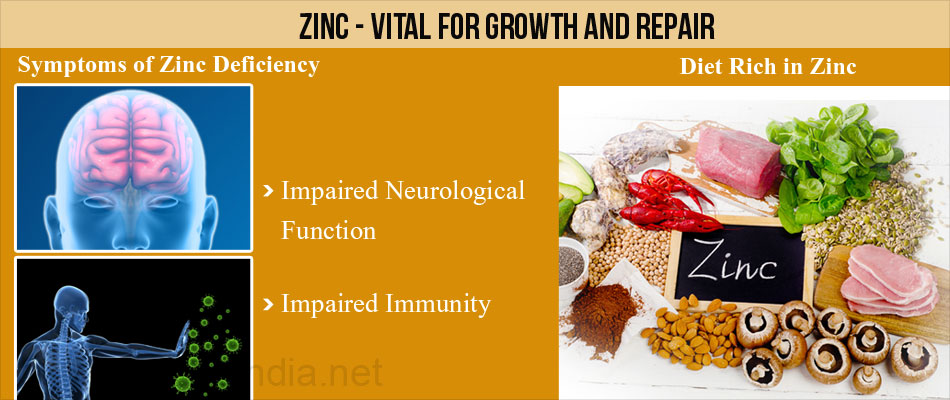- Jarosz M, Olbert M, Wyszogrodzka G, Młyniec K, Librowski T. Antioxidant and anti-inflammatory effects of zinc. Zinc-dependent NF-κB signaling. Inflammopharmacology 2017 Jan 12 - (doi: 10.1007/s10787-017-0309-4. [Epub ahead of print]. PMID: 28083748.)
- Wrobel JK, Power R, Toborek M. Biological activity of selenium: revisited. IUBMB Life 2016 Feb; 68(2): 97-105 - (doi: 10.1002/iub.1466. PMID: 26714931.)
- Freeland-Graves JH, Mousa TY, Kim S. International variability in diet and requirements of manganese: causes and consequences. J Trace Elem Med Biol 2016 Dec; 38: 24-32 - (doi: 10.1016/j.jtemb.2016.05.004. PMID: 27264059.)
- Peña-Rosas JP, De-Regil LM, Gomez Malave H, Flores-Urrutia MC, Dowswell T. Intermittent oral iron supplementation during pregnancy. Cochrane Database Syst Rev 2015 Oct 19; (10): CD009997 - (doi: 10.1002/14651858.CD009997.pub2. PMID: 26482110.)
- Farebrother J, Naude CE, Nicol L, Andersson M, Zimmermann MB. Iodised salt and iodine supplements for prenatal and postnatal growth: a rapid scoping of existing systematic reviews. Nutr J 2015 Sep 2; 14: 89 - (doi: 10.1186/s12937-015-0079-z. PMID: 26330302.)
- Rosanoff A, Dai Q, Shapses SA. Essential nutrient interactions: does low or suboptimal magnesium status interact with vitamin D and/or calcium status? Adv Nutr 2016 Jan 15; 7(1): 25-43 - (doi: 10.3945/an.115.008631. PMID: 26773013.)
- Potassium in diet. U.S. National Library of Medicine. Medline Plus. Accessed January 19, 2017. - (doi: 10.3945/an.115.008631. PMID: 26773013.)
- Kim KM, Choi HS, Choi MJ, Chung HY. Calcium and vitamin D supplementations: 2015 Position Statement of the Korean Society for Bone and Mineral Research. J Bone Metab 2015 Nov; 22(4): 143-9 - (doi: 10.11005/jbm.2015.22.4.143. PMID: 26713305.)
- Komoroski M, Azad N, Camacho P. Disorders of bone and bone mineral metabolism. Handb Clin Neurol 2014; 120: 865-87 - (doi: 10.1016/B978-0-7020-4087-0.00058-9. PMID: 24365358.)
What is Mineral Deficiency?
Mineral deficiency is a condition where the concentration of a mineral element that is essential for the body becomes very low and leads to impairment of function directly related to the mineral.
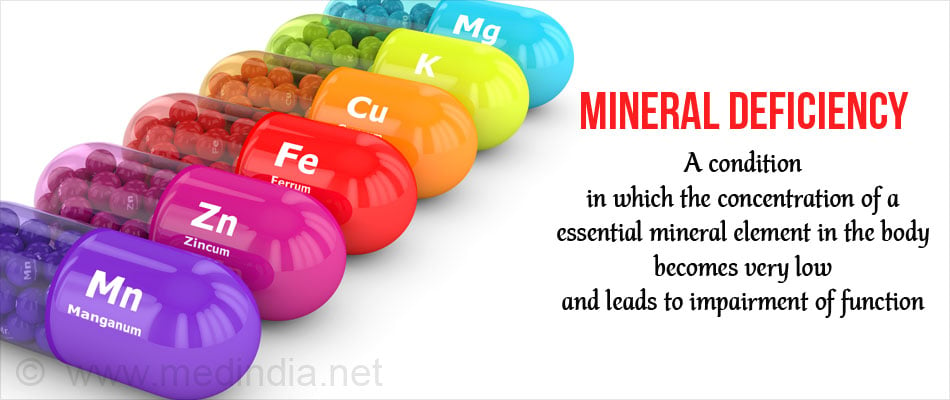
What are Some of the Important Minerals?
Calcium
Calcium is the most abundant mineral in the human body and helps in the formation and maintenance of strong bones and teeth. Blood calcium level is regulated by vitamin D and several hormones, including parathyroid hormone, thyrocalcitonin, and cortisol that control absorption, excretion and bone turnover of calcium. Old age and inadequate calcium in the diet can lead to calcium deficiency, also known as hypocalcemia.
Deficiency Symptoms:
- Muscle pain, spasms and twitching
- Tingling in fingers, toes and face
- Fragile bones prone to fractures
- Brittle nails
- Coarse hair
- Pale and dry scaly skin
- Tooth decay
- Loss of memory
- Confusion
- Insomnia
Diagnosis:
Diagnosis is carried out by blood testing. The test is designed to measure total calcium. Abnormal levels of total calcium indicate an underlying problem, in which case other tests including ionized calcium and urine calcium may also be required.
Treatment:
- Calcium carbonate supplements at a dose of 600 mg/day for adults.
Foods to Combat Calcium Deficiency:
- Milk
- Cottage cheese / Paneer
- Goat cheese
- Whey protein
- Kidney beans
- White beans
- Mustard greens
- Lady’s finger (Bhindi)
- Almonds
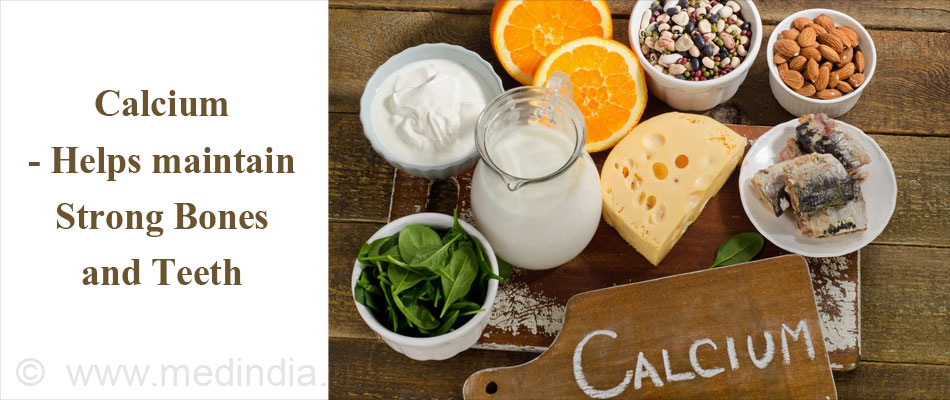
Iodine
Iodine is an essential trace element in the diet responsible for the production thyroid hormones. Iodine deficiency can cause pregnancy-related complications.
Deficiency Symptoms:
- Lethargy, muscular weakness, and chronic fatigue
- Unusual weight gain
- Hair loss
- Puffy face
- Mental retardation (in infants and children whose mothers were iodine deficient during pregnancy)
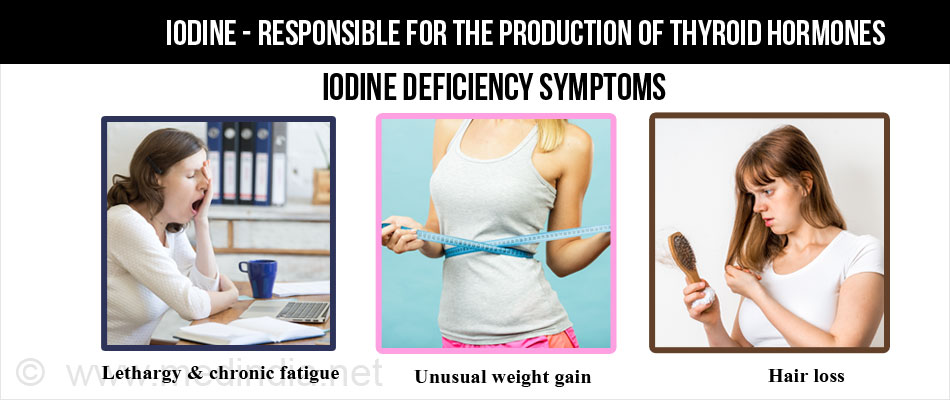
Diagnosis:
Iodine deficiency is generally not measured in individual patients, but only in case of population-based studies. Indirect diagnosis is made based on its effect on thyroid function. Clinical observation of any enlargement of the thyroid gland (goiter) is indicative of iodine deficiency. A definitive diagnosis of hypothyroidism can be made by laboratory tests that measure the levels of thyroxine (T4),triiodothyronine (T3) and thyroid stimulating hormone (TSH).
Treatment:
- Regular use of iodized table salt.
- Administration of multivitamin tablets containing at least 250 µg of iodine to pregnant women.
- In case of hypothyroidism, daily oral administration of thyroxine.
Foods to Combat Iodine Deficiency:
- Iodized table salt
- Cow’s milk
- Cheese
- Eggs
- Salt water fish
- Seaweed
- Soy milk / sauce
- Yogurt
Iron
Iron is an essential mineral that is a component of hemoglobin, the red pigment of red blood cells (RBC), responsible for the transport of oxygen in the blood. It is also involved in cellular respiration as a component of the enzyme complex cytochrome P450. Iron deficiency is characterized by a sharp fall in hemoglobin levels.
Deficiency Symptoms:
- Anemia
- Exhaustion
- Shortness of breath
- Restless leg syndrome
- Headache
- Anxiety
- Hair loss
Diagnosis:
Clinical examination can give indications that the patient is suffering from iron deficiency. A complete blood count (CBC) revealing sub-optimal levels of hemoglobin (<7-8 g/dl) is a confirmatory test. The level of iron stores can be assessed by a ferritin test. The total iron-binding capacity (TIBC) indirectly measures the levels of transferrin, a protein that iron attaches itself to help in moving around in the blood.
Treatment:
The standard treatment for iron deficiency is oral supplementation with iron. This should be taken on an empty stomach. As vitamin C increases the absorption of iron, the iron tablet can be taken with a glass of orange or lime juice.
Foods to Combat Iron Deficiency:
- Dark green leafy vegetables
- Red meat
- Organ meat - liver
- Dry fruits and nuts
- Breakfast cereals fortified with iron
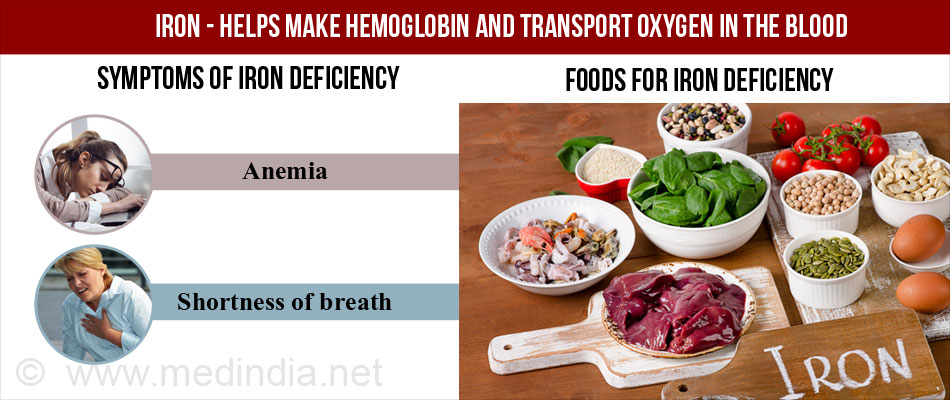
Magnesium
Magnesium is a very important mineral that is an essential co-factor for many enzyme-catalyzed biochemical reactions in the body. It is required for normal functioning of the musculoskeletal, nervous, and immune systems.
Deficiency Symptoms:
Since magnesium deficiency can occur in conjunction with calcium and potassium deficiency, the latter should be kept in mind while assessing the symptoms.
- Muscle cramps and spasms
- Irregular heart-beats (arrhythmia)
- Weakness
- Seizures
- Confusion
- Anxiety
- Twitching
Diagnosis:
Magnesium testing should be considered when the levels of calcium and potassium are persistently low, or when there are deficiency symptoms. A test result indicating low magnesium level signifies either inadequate dietary intake or excessive excretion. Therefore, the corresponding diseases impacting these parameters should be kept in mind in the differential diagnosis.
Treatment:
Magnesium supplementation remains the mainstay of treatment. Magnesium salts of oxalate or gluconate can be administered orally. In case of severe deficiency, parenteral route may be considered with regular monitoring.
Foods to Combat Magnesium Deficiency:
- Dark leafy greens (e.g. spinach)
- Fish
- Beans and peas
- Whole grains
- Dried fruits and nuts
- Avocados
- Yogurt
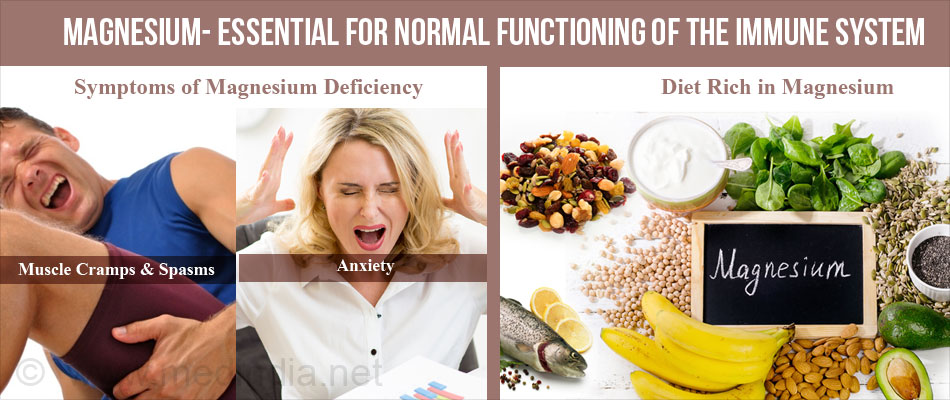
Manganese
Manganese is a micronutrient that is a component of several enzyme complexes and helps in various metabolic functions. It is required for the metabolism of carbohydrates, amino acids, and cholesterol, and in the formation of bones, connective tissues, sex hormones and clotting factors. It also helps to maintain normal brain function and blood sugar levels. It facilitates calcium absorption and wound healing. It also has an antioxidant function.
Deficiency Symptoms:
- Impaired growth
- Impaired reproductive function
- Impaired glucose tolerance
- Skeletal abnormalities
- Altered carbohydrate and lipid metabolism
Diagnosis:
Manganese deficiency can be detected by testing the blood or serum. The analysis is carried out using an automated equipment such as an inductively coupled plasma-mass spectrometer.
Treatment:
Treatment relies upon oral multivitamin / mineral supplementation.
Foods to Combat Manganese Deficiency:
- Pecan nuts
- Brown rice, cooked
- Spinach, cooked
- Raisin bran cereal
- Green tea
- Oatmeal cereal
- Whole wheat bread
- Pineapple
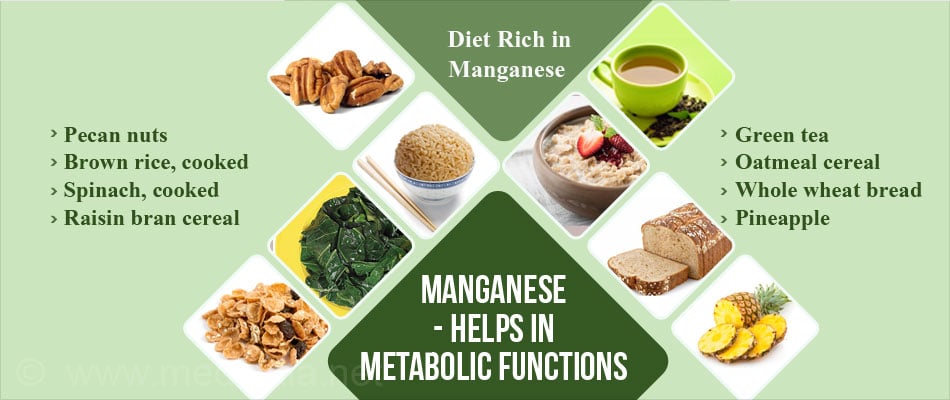
Phosphorous
Phosphorus is a very important mineral that is essential for the development and maintenance of teeth and bones. It is the second most abundant mineral in the human body and is essential for making proteins for the growth, maintenance, and repair of cells and tissues. It is also required for muscle contraction and nerve impulse conduction. It is an essential component of deoxyribonucleic acid (DNA) and ribonucleic acid (RNA), and adenosine triphosphate (ATP).
Deficiency Symptoms:
- Excessive fatigue / weakness
- Loss of appetite
- Irritability
- Numb / burning / tingling sensation in extremities
- Diffuse bone pain
- Joint pain / swelling / stiffness
- Susceptibility to dental cavities
- Brittle hair and nails
Diagnosis:
A diagnosis is based on a blood test if the physician suspects that there is a deficiency, or in conjunction with abnormal levels of calcium. The test provides information about the phosphorus level status in the blood, but in order to diagnose the underlying disease condition, other tests are warranted.
Treatment:
Phosphorus deficiency can be treated by taking adequate amounts (recommended daily allowance of 1200 mg for adults, both male and female, and 800 mg for children) in the form of supplements and multivitamins.
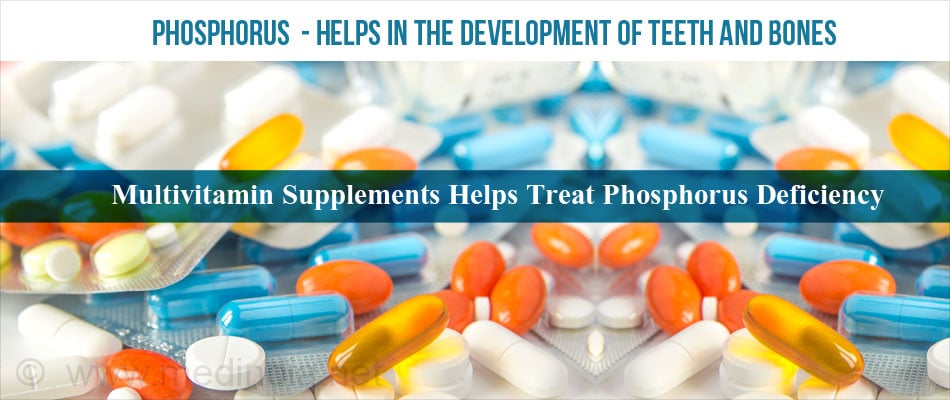
Foods to Combat Phosphorus Deficiency:
- Meat
- Tuna fish
- Lobster
- Milk
- Cheese
- Yogurt
- Cereals (rice, wheat germ, maize)
- Pulses, legumes and vegetables (broccoli, peas, potatoes)
- Nuts (almond, cashew nuts, pistachio, walnuts)
- Oil seeds (mustard seed, sunflower seed)
Potassium
Potassium is essential for the proper functioning of cells, tissues and organs. Being an electrolyte, potassium, along with sodium, is required for maintaining the membrane potential of cells, as well as regulation of acid-base balance in the body. It is essential for the electrical activity of the heart and is also involved in skeletal and smooth muscle contraction and for optimal nerve activity.
Deficiency Symptoms:
- Hypertension
- Congestive heart failure
- Nausea and vomiting
- Tingling and numbness
- Abdominal cramps and bloating
- Constipation
- Cardiac arrhythmia
- Muscle cramps, fatigue and weakness
- Depression and other mood changes
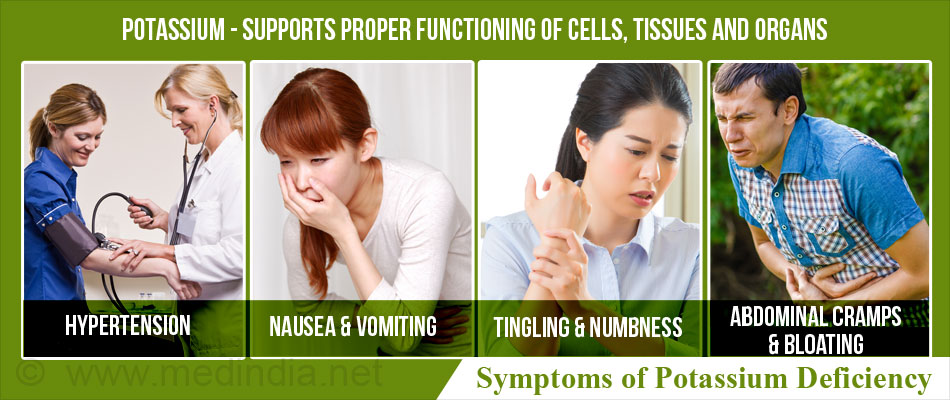
Diagnosis:
Abnormalities in potassium levels can be determined by a blood test. This can detect both potassium deficiency (hypokalemia) and potassium elevation (hyperkalemia). This test is especially used to monitor kidney failure patients undergoing hemodialysis.
Treatment:
Potassium supplementation is recommended only under medical supervision. Children, especially should not be given potassium supplementation until prescribed by a medical practitioner. Generally, these supplements are available as potassium salts of acetate, gluconate, bicarbonate, citrate, and chloride.
Foods to Combat Potassium Deficiency:
- Red meat and chicken
- Fish (salmon, cod, flounder, sardines)
- Fruits (bananas, citrus juice, avocados, apples, raisins, apricots)
- Leafy greens (spinach, parsley, lettuce, broccoli)
- Peas and lima beans
- Tomatoes
- Potatoes
- Whole grains and wheat germ
- Seeds and nuts
Selenium
Selenium is a trace element and is required in small amounts for maintenance of health. As an essential component of enzymes, it acts as an antioxidant and catalyzes the production of active thyroid hormones. It is also required in the maintenance of optimal immune functions.
Deficiency Symptoms:
- Memory lapses / sluggish memory and difficulty concentrating
- Lowered immunity (increased susceptibility to infections)
- Hair fall
- Discoloration of skin and nails
- Tiredness and fatigue
- Infertility / recurrent miscarriage
- Poor wound healing
Diagnosis:
A definitive diagnosis can be made based on a blood test, which measures the level of selenium in the blood.
Treatment:
Selenium deficiency can be corrected by selenium supplementation, which is available in combination as multivitamin / multimineral formulations, or by itself in the form of selenomethionine or as sodium selenite or sodium selenate. Importantly, the bio-availability of selenomethionine is much higher (~90%) than the selenite or selenate forms.
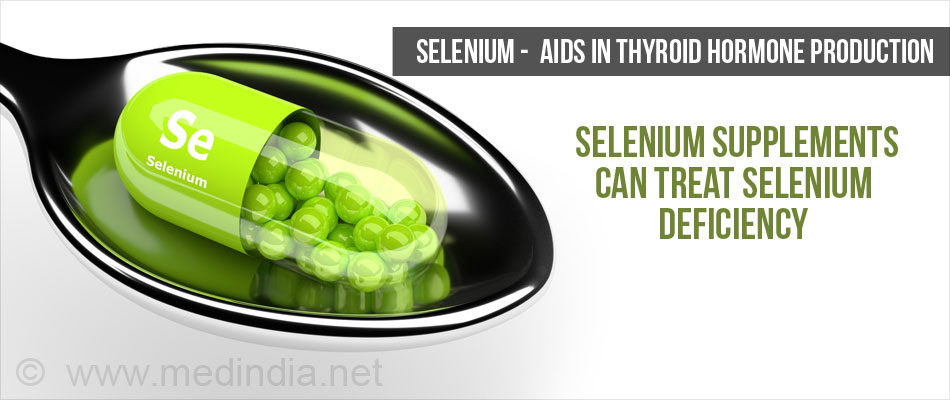
Foods to Combat Selenium Deficiency:
- Brazil nuts
- Red meat
- Organ meat - liver
- Chicken
- Eggs
- Fish (cod, tuna, shellfish, sardines, halibut)
- Mushrooms
- Sunflower seeds
- Wheat germ
- Bread, fortified
Sodium
Sodium is an essential element of the human body and the most common form of it is table salt (sodium chloride). Sodium is required for regulating blood pressure and for maintaining fluid balance. It is also essential for nerve impulse conduction and muscle contraction.
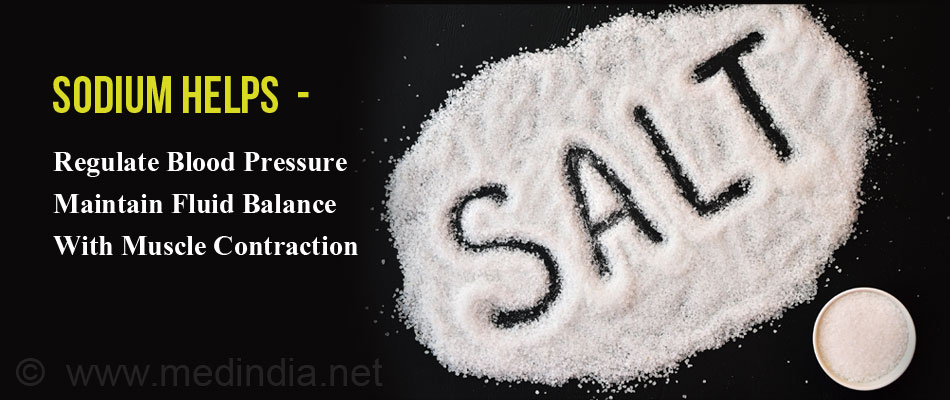
Deficiency Symptoms:
Sodium deficiency leads to lowering of the level of sodium in the blood (hyponatremia), which occurs in certain disease conditions like kidney failure and in some types of cancer. The main symptoms of sodium deficiency are given below:
- Fatigue and lethargy
- Confusion
- Muscle cramps / spasms
- Headache
- Nausea and vomiting
- Dizziness
- Seizure and coma (in severe cases)
Diagnosis:
Sodium deficiency can be suspected if the patient presents with prolonged vomiting or profuse sweating. However, a definitive diagnosis can only be made based upon a blood test that measures the level of sodium ions (Na+) in the serum.
Treatment:
Treatment usually involves adjustment in diet and lifestyle. In severe cases of hyponatremia, fluids and electrolytes need to be administered intravenously. Medications may also be needed to treat the underlying cause of hyponatremia as well as to manage the symptoms.
Foods to Combat Sodium Deficiency:
- Table salt
- Salted snacks (nuts, chips, popcorn)
- Meat (bacon, ham) / fish / poultry (smoked, cured, salted, canned)
- Sauces / salad dressings (soy sauce)
- Milk
- Cheese (Roquefort)
- Pickles
- Beet
- Celery
Zinc
Zinc is an important trace element that is required for optimal immune function, growth and repair, hormone production, wound healing, and acts as an antioxidant.
Deficiency Symptoms:
- Impaired neurological function
- Impaired immunity
- Growth retardation
- Food allergy
- Diarrhea
- Gastrointestinal problems (abdominal pain, diarrhea, anorexia, glossitis)
- Skin problems (alopecia, dermatitis, acne, stomatitis)
- Hormone imbalances
Diagnosis:
Zinc deficiency can be diagnosed by conducting a blood test, which measures its level in the serum or plasma. The test is important because zinc is not stored in the body and can fluctuate with time, so it must be measured directly as and when required.
Treatment:
Zinc deficiency can be treated by multivitamin supplements in which the element may be present as gluconate, acetate or sulfate.
Foods to Combat Zinc Deficiency:
- Oysters
- Meat (lamb, pork, beef, chicken)
- Lobsters
- Pumpkin seeds
- Yogurt
- Chickpeas
- Cashews
